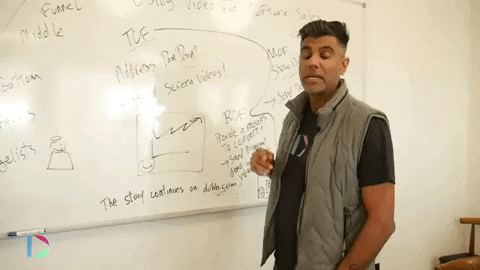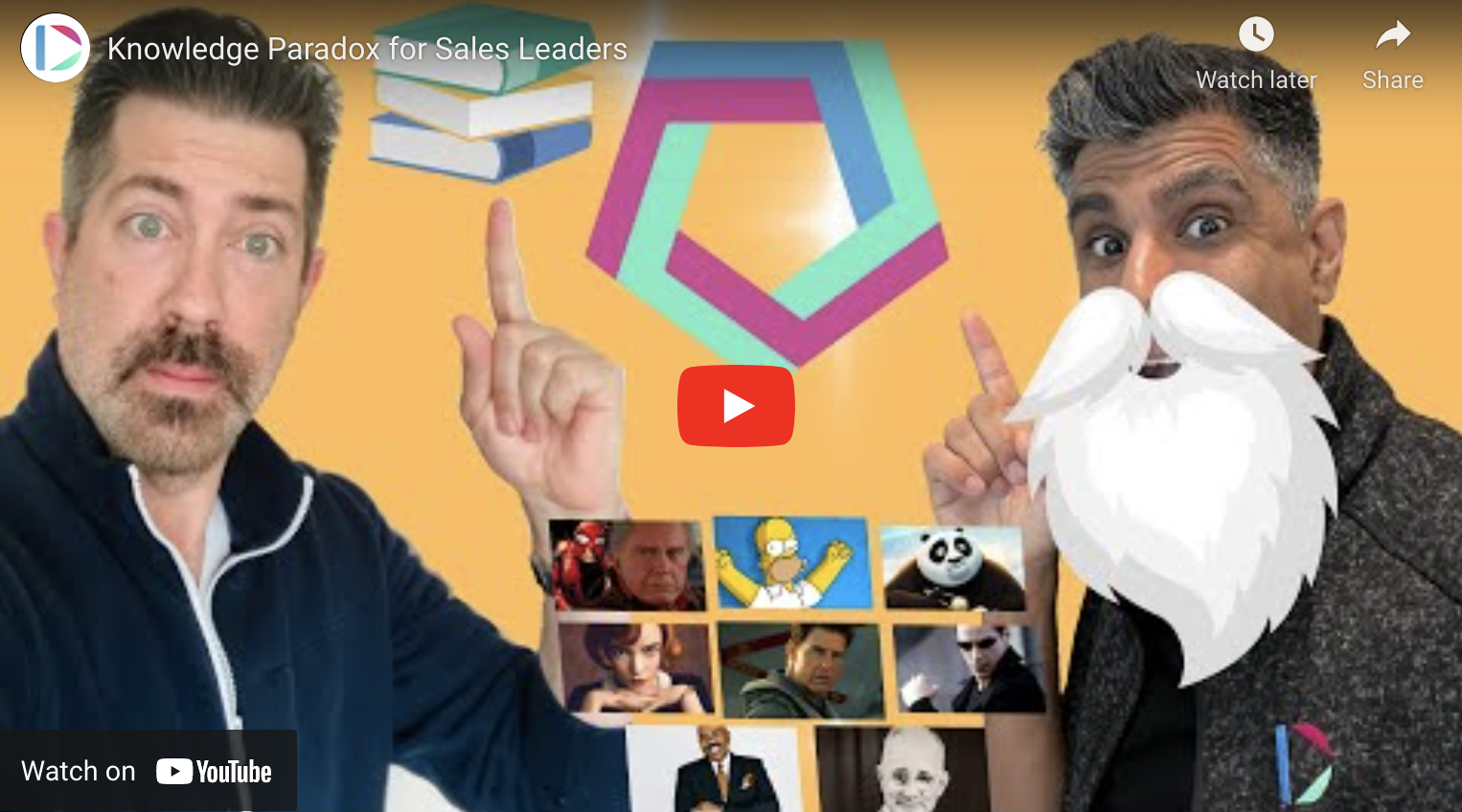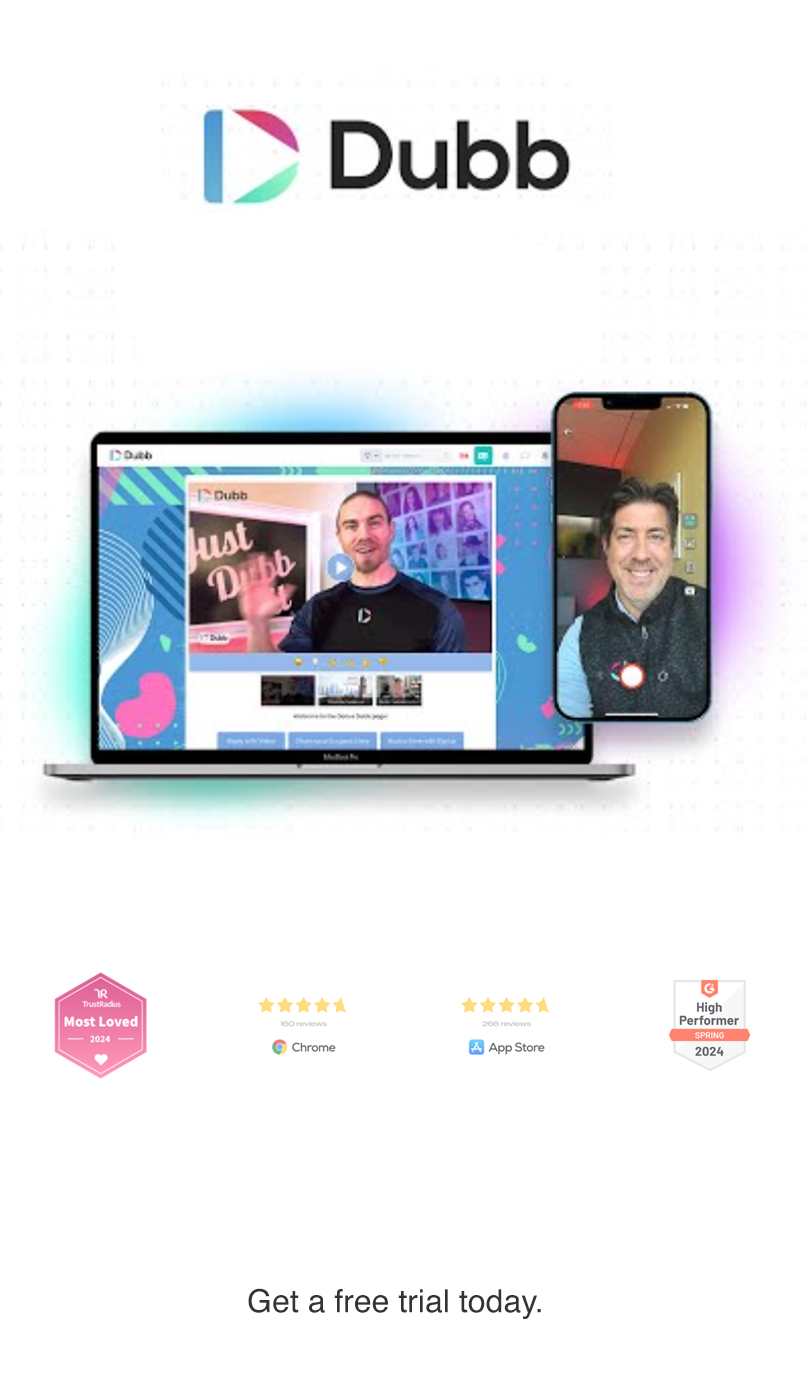In the sales context, have you ever heard of this idea called the “knowledge paradox”? Along with this, are you looking for a better way to get beyond the theory and better execute in your business?
My colleague Rob and I discussed the knowledge paradox in a recent episode of the RevShow by Dubb. It is a fascinating topic and one that certainly deserves your attention.
In this blog post, I want to take a deeper dive into the knowledge paradox. We are going to discuss what it is, how you can navigate the knowledge paradox in a sales context, and what you can do to combat the knowledge paradox. Hope you enjoy the discussion!
This conversation about the knowledge paradox is just one of the many topics that we discuss on the RevShow. If you want to get more of this content delivered directly to your YouTube feed, feel free to subscribe by clicking here.

The Knowledge Paradox: Some First Principles
So what exactly is the knowledge paradox? Simply put, the knowledge paradox is this idea that learning has to be active, not passive. By active, I mean that you are applying the knowledge you already have in the real world. On the other hand, taking a passive approach means that you are constantly looking to consume media (whether it is in the form of books, podcasts, videos, or something else) so that you can aggressively act at some future date.
Think about it this way: if you have all the time in the world to gain knowledge, you’re not going to have a lot of time to execute and apply that knowledge. On the other hand, if you’re bright-eyed and bushy-tailed at 16 years old and run onto the battlefield without any knowledge, chances are that we know you’re going to end up.
The knowledge paradox speaks scores on the ideal way to acquire knowledge. It’s so easy to think that we need to read a certain number of books or articles before executing a specific task. For those of us who are more visually inclined, it may feel tempting to search for that YouTube video that is going to give you all the skills you need to reach your goals. Searching for knowledge isn’t inherently bad, but it becomes a negative if it comes at the cost of taking action.
In effect, the idea here is to find balance between knowledge and execution. The highest performing individuals combine both as they aggressively pursue their goals.
The Democratization of Information
One of the more influential individuals in democratizing information on the internet is Sal Khan. Even if you don’t recognize the name, you probably have seen some of his videos on Khan Academy. I had the pleasure of meeting Sal. He was an extremely humble and intelligent person.
Sal has taught us that information has become infinitely democratized. Along with Khan Academy, we have YouTube and other sources of information. If you really think about it, all of the information that we need is out there. It is all accessible. The key here, though, is figuring out ways to apply all of that information.
The Battle is Internal
Generally speaking, you want to avoid being passive. Passivity, in a sense, is a selfish trait. You aren’t able to use your skills, traits, and experiences to help improve the world. Even though you probably have enough knowledge to make a positive contribution, your inner voice is preventing you from participating. That inner voice can represent so many types of fears, including things like imposter syndrome, fear of failure, fear of success, or something else.
These fears can be immensely powerful and prevent us from taking action. For many of us, it can be far more comfortable to consume that additional piece of content rather than take a risk and put our knowledge into action. After all, when we are studying or passively gaining more knowledge, it can feel like we are making substantial progress. In the end, however, if we aren’t able to implement the knowledge that we have learned, all of that “progress” is in our heads and not in the real world.
To reiterate, I’m not saying that knowledge is bad. Knowledge and execution are on a spectrum, and the highest performers leverage both. Simultaneously, however, those highest performers recognize that they need to be aggressive. Instead of passively consuming valuable content and moving on to the next thing, they are able to overcome their fears and put those learnings into action.
Seeing the Knowledge Paradox in Sales
You can find the knowledge paradox in all facets of life. Whether you are trying to learn a new hobby or are looking to level up in your career, you are going to encounter this phenomenon. It will be up to you to recognize it and take steps to combat it (which we’ll discuss below).
The knowledge paradox is especially prevalent in the sales world. As sales professionals, we are constantly looking for ways to better convert our prospects and generate more sales. There is plenty of valuable content out there that can help us become better salespeople. At the same time, if you have all of this sales learning and you aren’t applying that learning to your daily practice, you aren’t going to achieve the results that you’re expecting.
An example is helpful here. Let’s say that you are taking a three-month course on sales prospecting. As all of us know, sales prospecting is a huge part of becoming an effective sales leader. The course may have some of the best ideas that you’ve ever heard on how to meet, nurture, and close sales prospects. With that said, if you aren’t applying those lessons the next day, you’re not making that dent in what you’re really trying to do.
Yes, it may feel great that you have all of this new knowledge about sales prospecting. It may cause you to become much more optimistic about your sales career. However, if you remain passive and don’t take action, all of those feelings will be temporary. Nothing will really change. In fact, you may be dead set on taking another course or consuming another piece of content so that you can eventually take action.
Learners vs. Leaders
One of the most important topics in this discussion is the idea of learners versus leaders. Initially, we all start out on the learning road. We’re all going in the same direction, as we attempt to learn some of the foundational principles of our craft or field.
At some point, however, that road twists. Individuals are either staying on the learning road or they are taking the offramp to become a leader. As I like to think of it, a leader is a server in disguise. Leadership is about removing roadblocks from people (specifically, your colleagues and clients). If you really think about it, a leader is a learner that decided to apply her knowledge and information to help others.
As a leader, when you are helping your team members and clients, you want to have purpose. If you don’t have purpose, then what’s the point of anything? At the end of the day, purpose is what drives you. Something else comes with that purpose, however. That “something else” is a great responsibility. It’s really important to remember this.
In the sales context, you have to constantly remind yourself of this truth. If you are a sales leader, you have a responsibility to lead with value. You need to avoid many of those old sales books, as they typically rely on tactics like manipulation, changing people’s behavior, and over-negotiating. The reality is that as a sales leader, you have a duty to do good. The more knowledge you gain, the more that you need to responsibly apply that knowledge. Especially as a sales leader, if you are acquiring really good sales knowledge but aren’t applying it, you’re essentially spinning in a circle.
Combatting the Knowledge Paradox
There is a balance here. If you spend all of your time in life learning, you’ll never have time to actually execute. On the other hand, if you don’t have a requisite baseline of knowledge, you will likely be flailing in the wind. Even though it may feel good to take action, you may be wasting a significant amount of time. In fact, if you act without this baseline of knowledge, you may be harming the short and long-term prospects of your business.
So what can we do to become more active and embrace the execution side of this spectrum?
Recognize the New Era of Knowledge
First, it’s important to recognize that education has been sold and purchased in weight. Books, seminars, and courses come down to how heavy and long they are. Economically speaking, this is how these types of media were valued. Assuming all else is equal, the longer or more in-depth that piece of content was, the more value would likely be ascribed to it.
The reality now? Information is extremely accessible. If you really think about it, you can get basically all of the information you need off of YouTube. This is extremely empowering. Now, we don’t need to go through that cycle of learning, where we are constantly looking for new information to arm us with everything that we need to execute. Rather, we can constantly learn and apply. We can learn and apply even more quickly than in the past.
Here’s a quick tip for when you are searching for YouTube content. To avoid wasting time and making your knowledge-gathering work more efficient, I recommend that you read summaries first. You can also try to watch the preview before investing your time and energy into a video. If you are thinking of reading a book, look for these types of summaries, whether they are TED talks, brief podcasts summarizing the book, or something else. By doing this, you can quickly see whether you can actually apply that knowledge to your business life. Most importantly, if you decide to read the book, you want to be able to read chapter one, put that chapter down, and apply it to whatever it is that you are doing.
So ultimately, recognize that there is this new era of knowledge that can make your life substantially easier. Before investing hours (or even days) consuming a book for your business, don’t hesitate to preview it through these other mediums. It can both save you a significant amount of time and help ensure that the knowledge that you’re gaining is directly relevant to your business.
Rethink “You Gotta Read This Book”
I’m sure you have often heard the phrase, “You gotta read this book.” Even if you don’t read many books in your day-to-day life, there’s probably an instance where a close friend or colleague is imploring you to read some book that changed his or her life.
Even though you may trust that close friend or colleague, you should be slightly cautious here. Just because they are interested in some book or resource doesn’t mean that it is going to provide value in your life. Moreover, all of us only have 24 hours per day. Those 24 hours are precious. We don’t get them back, so it’s supremely important to spend those hours in the highest impact ways.
One of the most important things is to really figure out the problems that we need to solve. Ask yourself: what are the actual challenges that I am facing in my business or organization? Take a few moments and honestly attempt to answer that question. With that answer in mind, go ahead and search for a referral on a book that you should read.
By doing this deep reflection first, you aren’t putting the cart before the horse. You are better off optimizing your time and getting the information that you need so that you can focus on execution. So go ahead and shorten your “want to read” book list. Make it more functional so that you can break through the noise. And don’t forget: books are sold in “weight” but they are paid in “wait.”
Embrace Video
At Dubb, we are huge proponents of video. Whether you are trying to convert a key prospect or simply want to catch up with one of your key customers, you can easily do so through video.
I also think that one of the most efficient ways to gain knowledge is through video. Simply put, video has become the most effective way to communicate, teach, and learn. In fact, when we learn from visuals, our minds are processing that information a whopping 60,000 times faster than text. Along with this, we can retain 95% of that content by using video. Pretty cool, right?
Because of this, I encourage you to use video when you are on your quest for knowledge. It doesn’t mean that you have to avoid books or text-based knowledge entirely. Rather, it may make more sense to have a bias for video. In doing so, you can both learn more efficiently and retain more of what you learn.

Think About Praxis
Information is accessible and applicable. Ultimately, this is the idea behind praxis, which is the process where a theory, lesson, or skill is enacted and realized. When we gain knowledge for sales mastery, it is so important to think about this concept of praxis. We need to be embracing a lean-in, knowledge acquisition environment.
Sure, there is nothing necessarily wrong with being entertained. Sales jobs can be demanding, so there is definitely value in unwinding and being entertained at the end of the day. At the same time, if you are reading a book in the hope that it will help you become a better sales leader or advance your business, you simply can’t sit back. You need to read for praxis, not entertainment.
Find the Axis of Knowledge and Application
If you are reading for praxis, you are getting much closer to the axis of knowledge and application. To get there, it is vital to embrace recognition. Recognition is so important because it represents that moment where you realize that you’ve become (or are on your way to becoming) a master. In other words, you can see the forest within the trees. You can see the chessboard that is in front of you.
The unfortunate thing? It takes time to get to that point. Achieving mastery in any discipline doesn’t happen at the snap of a finger. You have to be disciplined and practice your craft. Yes, you need to obtain the initial knowledge to get started. But once you have that, you need to search for this corner of knowledge and application. Consistency and repetition are your best friends here.
If you really think about it, repetition is the application of what it is that you are doing. You aren’t waiting for something to happen; rather, you are applying those lessons right away. With repetition and perspective in hand, you need to keep taking action. Finding the axis of knowledge and application may not necessarily be easy, but it is a task that is absolutely worth taking on.
Become an Empathetic Leader
No matter our goals, we are all on lifelong quests for knowledge. Whether we want to become top sales leaders within our organizations or want to take on a top sales role somewhere else, we need to constantly get better at our craft.
Socrates once said, “As for me, all I know is that I know nothing.” The reason why I love this quote is that it shows us that the more we learn, the more that we have to learn. Simply put, we can’t learn everything. The second that we attain one piece of knowledge, we are forced to go down the rabbit hole to further understand that piece of knowledge.
Ultimately, by being humble and empathetic toward others, we can learn in real time. Being a good, empathetic listener is a way to help us learn in real-time and more efficiently travel down that rabbit hole of knowledge. From there, we can also exercise our empathetic listening skills when applying that knowledge. By understanding what others are going through, you can better leverage the knowledge that you have and apply that knowledge to solve real problems in the world.
In the sales context, it all comes down to listening, conversing, connecting, and converting. That being said, you can’t do any of that if you aren’t able to listen and be empathetic. So when you are both acquiring the knowledge that you are seeking and working to apply that knowledge, make sure that you are listening and being empathetic.

Embracing the Paradigm Shift in Knowledge
Ultimately, there is a paradigm shift from knowledge. It goes from gaining knowledge from a status perspective and a social class perspective to a tactical perspective. In other words, that tactical perspective goes something like, “I need to gain knowledge today so that I can apply it tomorrow. It isn’t, “I need to read this book so that I can be more scholarly.”
As sales leaders, we don’t have the time to be so scholarly. We don’t have time to sit in our offices and not pass on acquired information to our teams. If we were just going to hold that knowledge to ourselves, we would be holding our teams back. Even if that knowledge could change the course of our organizations, being too passive makes all of those gains illusory.
Instead of keeping a wall between you and your sales team, make sure that you are embracing this tactical perspective. Doing this, you help your colleagues and company grow.
Want to learn more about the knowledge paradox for sales leaders or any other topic related to business sales and marketing? Check out our blog. We’re always happy to discuss these topics as well, so don’t hesitate to reach out. We look forward to hearing from you!


